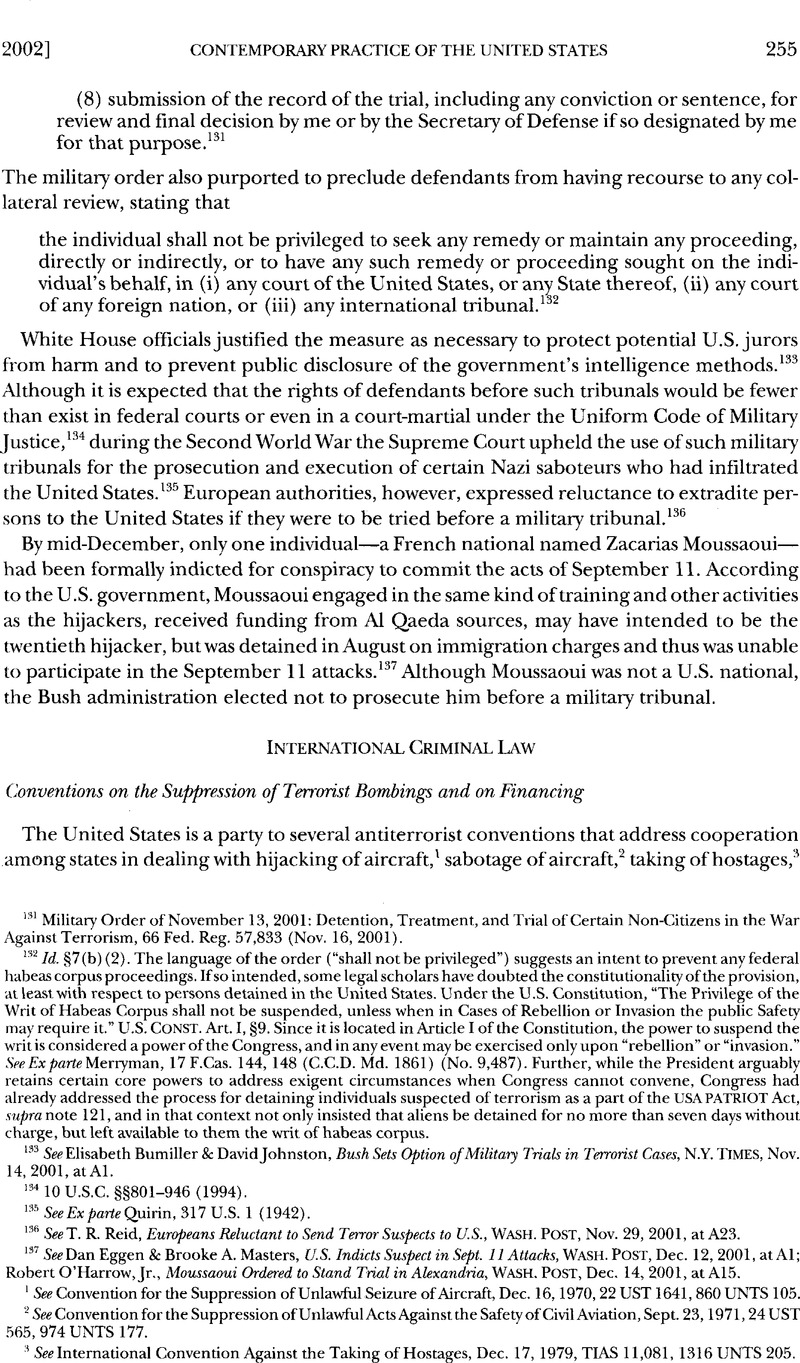No CrossRef data available.
Article contents
Conventions on the Suppression of Terrorist Bombings and on Financing
Published online by Cambridge University Press: 10 March 2017
Abstract

- Type
- Contemporary Practice of the United States Relating to International Law
- Information
- Copyright
- Copyright © American Society of International Law 2002
References
1 See Convention for the Suppression of Unlawful Seizure of Aircraft, Dec. 16,1970, 22 UST 1641, 860 UNTS 105.
2 See Convention for the Suppression of Unlawful Acts Against the Safety of Civil Aviation, Sept. 23,1971,24 UST 565, 974 UNTS 177.
3 See International Convention Against the Taking of Hostages, Dec. 17, 1979, TIAS 11,081, 1316 UNTS 205.
4 See Convention on Offences and Certain Other Acts Committed on Board Aircraft, Sept. 14, 1963, 20 UST 2941, 704 UNTS 219.
5 See Convention on the Prevention and Punishment of Crimes Against Internationally Protected Persons, Including Diplomatic Agents, Dec. 14, 1973, 28 UST 1975, 1035 UNTS 167.
6 See International Convention for the Suppression of Terrorist Bombings, GA Res. 52/164 (Dec. 15,1997), 37 ILM 249 (1998) [hereinafter Terrorist Bombings Convention].
7 See International Convention for the Suppression of the Financing of Terrorism, GA Res. 54/109 (Dec. 9,1999), 39 ILM 270 (2000) [hereinafter Terrorism Financing Convention].
8 [Editor’s Note: Article 19 of the Convention provides:
-
1.
1. Nothing in this Convention shall affect other rights, obligations and responsibilities of States and individuals under international law, in particular the purposes and principles of the Charter of the United Nations and international humanitarian law.
-
2.
2. The activities of the armed forces during an armed conflict, as those terms are understood under international humanitarian law, which are governed by that law, are not governed by this Convention, and the activities undertaken by military forces of a State in the exercise of their official duties, inasmuch as they are governed by other rules of international law, are not governed by this Convention.]
9 [Editor’s Note: Article 2(1) of the Convention provides that a person commits an offense under the Convention if he or she “unlawfully and intentionally delivers, places, discharges or detonates an explosive or other lethal device in, into or against a place of public use, a State or government facility, a public transportation system or an infrastructure facility” with “the intent to cause death or serious bodily injury” or “the intent to cause extensive destruction of such a place, facility or system, where such destruction results in or is likely to result in major economic loss.” Article 2 (2)-(3) extends the coverage to persons who attempt such acts and to persons who are accomplices to such acts, or who direct, organize, or otherwise contribute to such acts.]
10 [Editor’s Note: Article 20(1) of the Convention provides:
Any dispute between two or more States Parties concerning the interpretation or application of this Convention which cannot be settled through negotiation within a reasonable time shall, at the request of one of them, be submitted to arbitration. If, within six months from the date of the request for arbitration, the parties are unable to agree on the organization of the arbitration, anyone of those parties may refer the dispute to the International Court of Justice, by application, in conformity with the Statute of the Court.]
11 [Editor’s Note: The dispute settlement provision contained in the Terrorism Financing Convention is the same as that quoted supra note 10 for the Terrorist Bombings Convention.]
12 Prepared Testimony of William H. Taft IV, U.S. Department of State Legal Adviser, Before the Senate Committee on Foreign Relations (Oct. 23, 2001) (on file at GWU).
13 See 147 Cong. Rec. S12054 (daily ed. Nov. 27, 2001).
14 See 147 Cong. Rec. S12464 (daily ed. Dec. 5, 2001).
15 See H.R. 3275 (2001); S. 1770 (2001). For the President’s message on proposed implementing legislation, see 147 Cong. Rec. SI 1100 (daily ed. Oct. 25, 2001).




